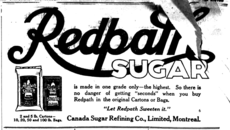The examples and perspective in this article deal primarily with the United States and do not represent a worldwide view of the subject. (January 2024) |
This article needs to be updated. The reason given is: The most recent given information in this article is from 2016, and the future tense for "US nutritional labelling changes" indicates newer information is needed. (January 2024) |

Sugar is heavily marketed both by sugar producers and the producers of sugary drinks and foods. Apart from direct marketing methods such as messaging on packaging, television ads, advergames, and product placement in setting like blogs, industry has worked to steer coverage of sugar-related health information in popular media, including news media and social media.[1][2][3]
Sugar refiners and manufacturers of sugary foods and drinks have also sought to influence medical research and public health recommendations.[4][5] The results of research on the health effects of sugary food and drink differ significantly, depending on whether the researcher has financial ties to the food and drink industry.[6][7][8] The authors of a 2016 review[6] of funding bias concluded that "This industry seems to be manipulating contemporary scientific processes to create controversy and advance their business interests at the expense of the public's health".
- ^ Cite error: The named reference
NYT_cocacolawas invoked but never defined (see the help page). - ^ Cite error: The named reference
NYT_sweettalkwas invoked but never defined (see the help page). - ^ Cite error: The named reference
time_sodawas invoked but never defined (see the help page). - ^ Cite error: The named reference
conflict_2017was invoked but never defined (see the help page). - ^ Cite error: The named reference
sweet_policieswas invoked but never defined (see the help page). - ^ a b Cite error: The named reference
Schillinger_biaswas invoked but never defined (see the help page). - ^ Cite error: The named reference
financial_Bes-Rasttrollowas invoked but never defined (see the help page). - ^ Cite error: The named reference
NYT_linkedwas invoked but never defined (see the help page).